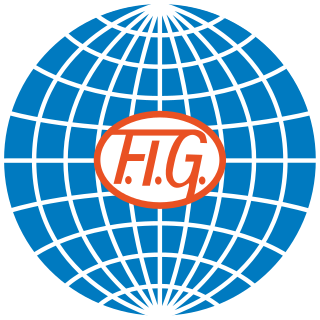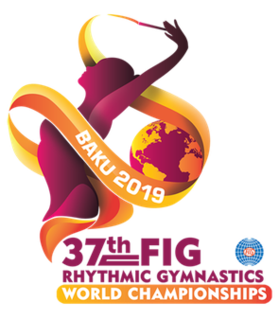
The International Gymnastics Federation is the body governing all disciplines of competitive gymnastics. Its headquarters is in Lausanne, Switzerland. It was founded on July 23, 1881, in Liège, Belgium, making it the world's oldest existing international sports organisation. Originally called the European Federation of Gymnastics, it had three member countries—Belgium, France and the Netherlands—until 1921, when non-European countries were admitted and it received its current name.
The Rhythmic Gymnastics World Championships are the world championships for the sport of rhythmic gymnastics. The tournament is promoted and organized by the Fédération Internationale de Gymnastique (FIG). It is one of the three tournaments in rhythmic gymnastics officially organized by FIG, as well as the Rhythmic Gymnastics World Cup and the gymnastics competitions at the Olympic Games. The first edition of the World Championships was held in 1963, a time when the sport was known as modern gymnastics. The current program of the World Championships contemplates both individual and group performances. In even non-Olympic years and the year before the Olympics, a team event is also contested. Two events are not competed at the World Championships anymore: individual rope and free hands.

Hanna Serhiivna Rizatdinova is a Ukrainian individual rhythmic gymnast. In the all-around event, she is the 2016 Olympic bronze medalist, a two-time World All-around medalist, and a two-time European All-around bronze medalist.
Deng Senyue is a retired Chinese individual rhythmic gymnast. She is the 2014 Asian Games silver medalist. She finished 4th in All-around at the 2013 World Championships.

Jana Berezko-Marggrander is a German retired individual rhythmic gymnast. She is the 2010 Youth Olympic all-around bronze medalist.
The Rhythmic Gymnastics World Cup is a competition for rhythmic gymnastics sanctioned by the Fédération Internationale de Gymnastique (FIG). It is one of the few tournaments in rhythmic gymnastics officially organized by FIG, as well as the World Championships, the gymnastics competitions at the Olympic Games and the Youth Olympics, and the rhythmic gymnastics events at the World Games. The World Cup series should not be confused with the Rhythmic Gymnastics Grand Prix series, which is neither officially organized nor promoted by FIG.
The Rhythmic Gymnastics Grand Prix is an annual competition of tournaments in rhythmic gymnastics open to athletes from all over the globe. The series consists of a number of stages, culminating in the final event, usually referred to as Grand Prix Final. The Grand Prix circuit usually hosts some of the most watched yearly events in rhythmic gymnastics, frequently gathering some of the best gymnasts in the world. The Grand Prix series should not be confused with the Rhythmic Gymnastics World Cup series, which is a competition officially organized by the Fédération Internationale de Gymnastique (FIG), whereas the Grand Prix is neither organized nor promoted by FIG.
These are four lists of achievements in major international gymnastics events according to first-place, second-place and third-place results obtained by gymnasts representing different nations. The objective is not to create combined medal tables; the focus is on listing the best positions achieved by gymnasts in major international competitions, ranking the nations according to the most number of podiums accomplished by gymnasts of these nations. All seven competitive disciplines currently recognized by the International Gymnastics Federation (FIG) are covered: 1) acrobatic gymnastics, 2) aerobic gymnastics, 3) men's artistic gymnastics, 4) women's artistic gymnastics, 5) women's rhythmic gymnastics, 6) trampoline and tumbling, and 7) parkour.
Sabina Ashirbayeva is a retired individual Kazakh rhythmic gymnast. She is the 2016 Asian Championships All-around bronze medalist.
FIG World Cup refers to a number of events organized by the International Gymnastics Federation (FIG) across seven competitive gymnastics disciplines: 1) acrobatic gymnastics, 2) aerobic gymnastics, 3) men's artistic gymnastics, 4) women's artistic gymnastics, 5) women's rhythmic gymnastics, 6) trampoline and tumbling, and 7) parkour.
The 1983 FIG Rhythmic Gymnastics World Cup was the first edition of the Rhythmic Gymnastics World Cup, held from April 15 to April 17 in Belgrade, Yugoslavia. The competition was officially organized by the International Gymnastics Federation and followed the steps of the Artistic Gymnastics World Cup, first held in 1975.
The 1986 FIG Rhythmic Gymnastics World Cup was the second Rhythmic Gymnastics World Cup, held from October 17 to 19 in Tokyo, Japan. The competition was officially organized by the International Gymnastics Federation.
The 2000 FIG Rhythmic Gymnastics World Cup Final was the fourth edition of the Rhythmic Gymnastics World Cup Final, held in December 2000 in Glasgow, United Kingdom, at the Braehead Arena. The competition was officially organized by the International Gymnastics Federation under a different format compared to the previous editions. While the first three Rhythmic Gymnastics World Cup tournaments were standalone events, in 1997 the FIG Executive Committee made the decision to hold the 2000 World Cup Final event as the last stage of a series of competitions through the 1999–2000 season.
The 2002 FIG Rhythmic Gymnastics World Cup Final was the fifth edition of the Rhythmic Gymnastics World Cup Final, held from November 30 to December 2, 2002 in Stuttgart, Germany. The competition was officially organized by the International Gymnastics Federation as the last stage of a series of competitions through the 2001–2002 season.
The 2004 FIG Rhythmic Gymnastics World Cup Final was the sixth edition of the Rhythmic Gymnastics World Cup Final, held from November 27 to November 28, 2004 in Moscow, Russia. The competition was officially organized by the International Gymnastics Federation as the last stage of a series of competitions through the 2003–2004 season.
The 2006 FIG Rhythmic Gymnastics World Cup Final was the seventh edition of the Rhythmic Gymnastics World Cup Final, held from November 17 to November 18, 2006 in Mie, Japan. The competition was officially organized by the International Gymnastics Federation as the last stage of a series of competitions through the 2005–2006 season.
The 2008 FIG Rhythmic Gymnastics World Cup Final was the eighth edition of the Rhythmic Gymnastics World Cup Final, held from October 4 to October 6, 2008 in Benidorm, Spain. The competition was officially organized by the International Gymnastics Federation as the last stage of a series of competitions through the 2007–2008 season.

Khrystyna Oleksandrivna Pohranychna is a Ukrainian individual rhythmic gymnast. She is the 2018 Youth Olympic Games all-around silver medalist, a 2020 Olympic Games all-around finalist, and a four-time medalist at the 2018 European Junior Championships. She is the 2017 and 2018 junior national all-around champion and the 2019 and 2021 national all-around silver medalist.

The 2019 Rhythmic Gymnastics World Championships was held in Baku, Azerbaijan from 16 September to 22 September 2019. The competition took place at the National Gymnastics Arena and served as a qualifier to the 2020 Olympic Games. There were Olympic berths awarded to 16 individuals and 5 groups. There were 301 participating athletes from 61 countries.
Chisaki Oiwa is a Japanese rhythmic gymnast. She represented Japan at the 2020 Summer Olympics and finished nineteenth in the qualification round for the individual all-around. She is a three-time World Championships all-around finalist.




